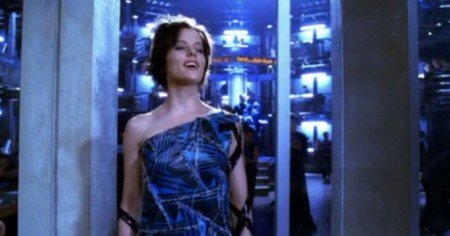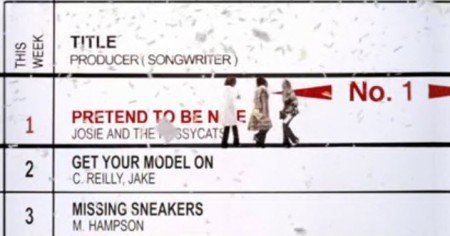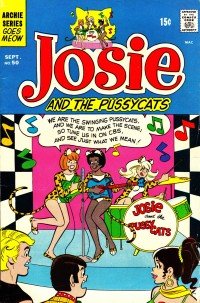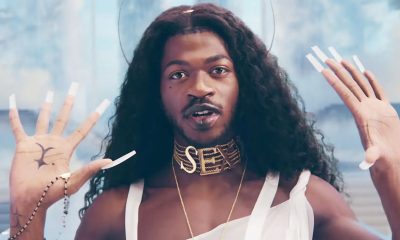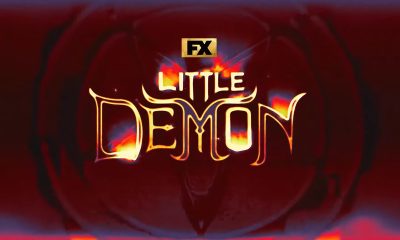Movies and TV
Josie and the Pussycats: Blueprint of the Mind Control Music Industry
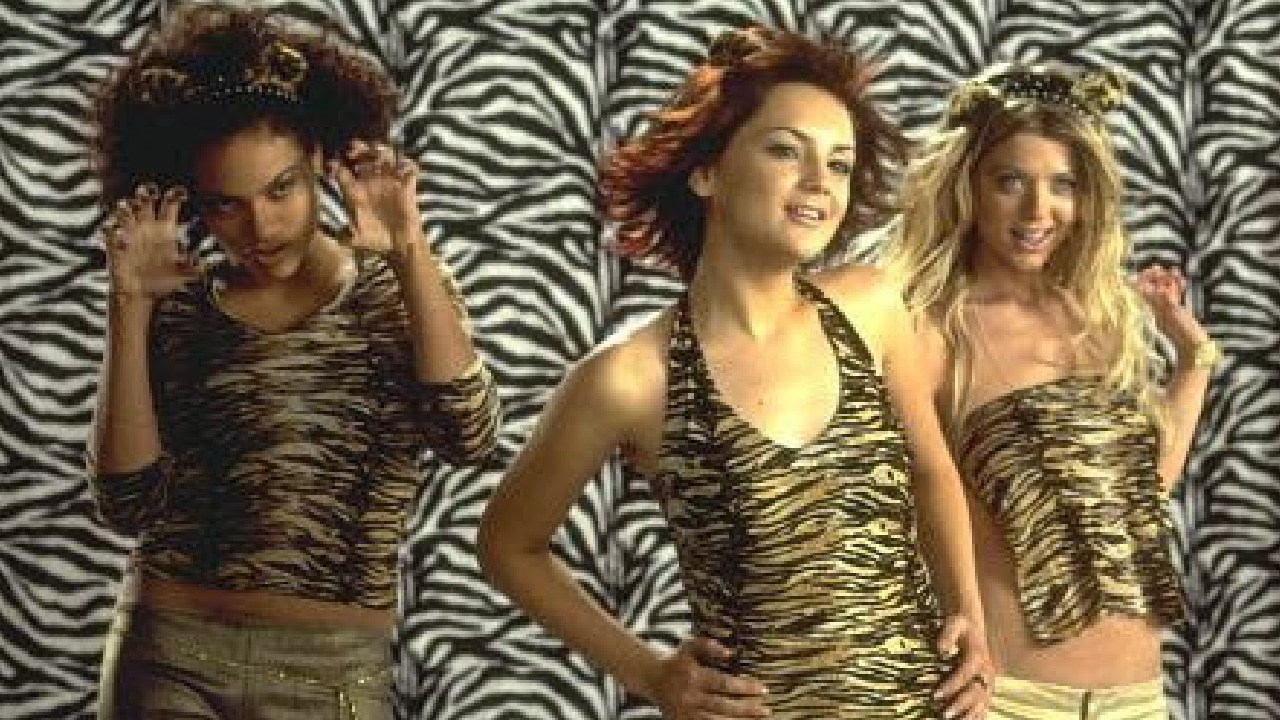
“Josie and the Pussycats” is a “girl band movie” aimed at children and young adolescents, especially young girls. At first glance, the flick seems to be one of those generic, God-awful teen movies. However, a closer look reveals how its overall tone and message are in sharp contrast to stereotypes of the genre. “Josie and the Pussycats” is indeed an acerbic critique of a morally bankrupt music industry. The most surprising thing about this 2001 movie is its frighteningly accurate predictions regarding today’s pop music and its Illuminati agenda: mind controlled artists, hypnotized masses, subliminal messages… it’s all there. This article will examine the movie’s themes and their relation to today’s music business context.
Josie and the Pussycats was released in 2001 by Universal. In music industry terms, 2001 is ancient history. Just to put you back in the context of the era: N’Sync were still singing Bye Bye Bye, Cisco wanted to see your thong and everybody was wondering Who Let the Dogs Out. Teens were going crazy for boy bands like the Backstreet Boys and everybody was dancing to Ja Rule. So, yes, it was a long time ago.
Josie and the Pussycats came out during that period, but it seems to foretell the death of the era. The movie starts with members of the boy band “Du Jour,” a spoof on the Backstreet Boys, dying in a forced plane crash. The group is then replaced by a girl band with a semi-punky attitude and non-threatening pop rock music. This pretty much reflects what actually happened in the years following the release of this movie: N’Sync and the Backstreet Boys disappeared from the preteen music market and were replaced by Miley Cyrus, Hilary Duff, the Jonas Brothers, and so on.

The Jonas Brothers’ semi-punky attitude and non-threatening pop rock music replaced the Backstreet Boys. They’re the male Josie and the Pussycats.
Despite the movie’s apparent lightheartedness, it displays a harsh and sustained judgment of the music business. It is also severely critical of the state of America’s youth. Teens and preteens are constantly depicted as a herd of brainless drones who are incapable of independent thinking and prone to hysteria.
But behind the usual “OMG these big corporations are so corporation-y” criticism, Josie and the Pussycats tackles, in an odd and humorous way, some of the darker sides of the music industry. These include the mind control of the masses and entertainers and even the assassination of artists who rebel or ask too many questions.
The Boy Band That Knew Too Much
As stated above, the movie starts with Du Jour (the boy band “of the day”) enjoying their enormous success. In their private jet, the vain and half-witted group of singers complain about petty things to their record executive Wyatt, who acts more like a legal guardian. Or, in mind control terms, a handler.
The band then asks Wyatt about strange sounds they heard in the acapella tracks of their latest song… and they want some answers.

Du Jour asking their exec Wyatt the purpose of the weird background tracks found on their latest song.
Wyatt’s answer is quite extreme: He straps on a parachute and jumps off the plane, leaving Du Jour to die in what media will refer to an “accidental” plane crash. This has actually happened in reality numerous times. Artists who start uncovering the darker side of the entertainment business, who ask too many questions, or worse, who plan to reveal these things to the public, are often dropped, publicly humiliated and scorned. And, as in Du Jour’s case, they are also sometimes killed for displaying such behavior.
Mega Records
Du Jour was signed with the world’s biggest record label, Mega Records. We soon learn that the company is much more than a record label.
Mega Records is, in fact, “in business” with the American government and the FBI to brainwash the “most influential demographic in the entire population”: the youth. While giving a tour of the label’s headquarters to visitors from foreign countries (who are there to learn how it’s done), Fiona, the eccentric CEO of Mega Records, has this to say:
“I’m sure you’re wondering why agent Kelly and the United States government would be so interested in what appears to be a record company. Well, I’m about to show you why.”
Fiona’s office then turns into an elevator and starts descending into a secret underground facility.
The label’s headquarters is, in fact, a control center for manipulating the minds of the American youth. It creates new fads, decides everything from “what clothes are in style to what slang is in vogue,” with the ultimate goal of making the youth continually spend money on one temporary trend after another.
Reality is, of course, more complex than that. Trends are (probably) not created in an underground control center in New York City. There is, however, truth in this near-cartoonish depiction of the music business. The entertainment industry is indeed connected to “higher powers” (as personified in the movie by the FBI agent) in order to sell the youth on the economic elite’s agenda. Popular culture not only attempts to sell products and brands to the audience but also ideas, values, and attitudes. In previous articles on the Vigilant Citizen, we have established that today’s agenda focuses on concepts such as transhumanism, Illuminati symbolism, premature sexualization, police state/militarization, and so forth.
Continuing her tour, Fiona says:
“But how, you may ask, can our operation be so effective? Sure these kids have brains like play dough, just waiting to be molded into shape, but something else must be going on, right?”
Fiona then explains that her label inserts subliminal messages in pop music in order to manipulate the youth into buying products and ideas. The label thus goes beyond the simple advertising of products. It conceals hidden messages in the music that bypass the audience’s conscious minds in order to directly reach their subconscious.
After the presentation, a foreigner asks Fiona “How can you control the rock bands? What if one of them discovers you are placing hidden messages in their music?” This is what she answers:
“Ever wonder why so many rock stars die in plane crashes? Overdosed on drugs? We’ve been doing this a long time. If they start to get too curious, our options are endless. Bankruptcies… shocking scandals… religious conversions!”
There are numerous real-life examples of celebrities who have been silenced, one of the most shocking and evident being Michael Jackson. After decades of being controlled by the entertainment business, he attempted to break free in the late 90s. He even spoke out about it. He then endured years of scandals, trials, public ridicule and financial difficulties. Michael Jackson still managed to keep singing and dancing, even organizing a world tour for 2010. Since previous attempts to destroy him failed, MJ got silenced… by force. So, it would seem that ten years after the release of this movie, shady celebrity sacrifices are still happening.
New 3D Technology
In an attempt to “take things to the next level,” Mega Records develops a new technology called “3DX Surround Sound.” This new technology “makes the music feel like it is happening all around you.” All the kids who attend Josie and the Pussycat concerts or watch them on TV have to purchase this headgear in order to hear the music.
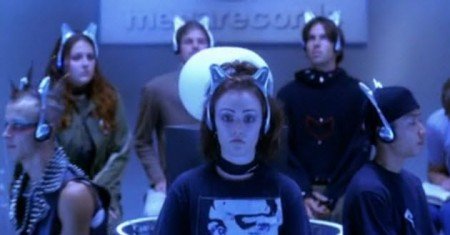
Hypnotized, mind controlled teens testing the new 3DX Technology in a Mega Records lab. Note that the girl in the middle is a “free thinker” that got kidnapped by the label in order to have experiments conducted on her.
Back in real life, we are seeing the commercialization of a very similar technology…

3D glasses are today’s hottest trend. They are required to view 3D movies, TV shows, and video games. Will this 3D technology bring new brainwashing possibilities? You betcha!
Josie and the Pussycats: From Nobodies to Sex Kittens Programming Stars
After the killing of Du Jour, record exec Wyatt is instructed to find a new band as soon as possible. The movie makes it clear that talent is absolutely irrelevant. The label just needs a good-looking group and it will take care of the rest. Then we are introduced to The Pussycats… and their lack of fans.
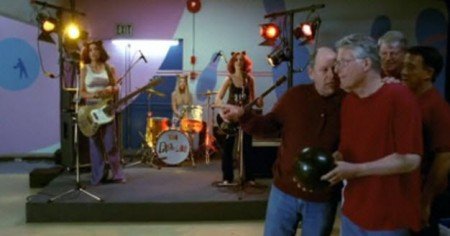
The Pussycats performing in a bowling alley, with nobody listening to them. Most overnight successes start from humble beginnings until the industry takes them, changes them and sells them to the public.
The rock band comprises three young ladies who wear leopard ears as a prop. It is quite obvious that nobody wants to hear their music and even their manager Alexander doesn’t seem to like it.
After hearing about Du Jour’s plane crash on television, The Pussycats leader, Josie, is motivated to “get out there” and obtain a record contract. At the same time, Wyatt is driving around in the small town of Riverdale, looking for a band to sign. Then it happens.
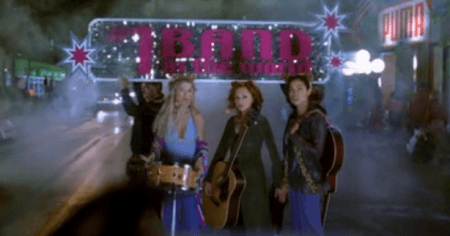
Wyatt literally runs into The Pussycats crossing the street. Some dudes coincidentally walk behind them holding a sign with “#1 Band in the World” on it. That’s pretty much all Wyatt needed to see to sign them.
Wyatt sits down with the girls and tells them how happy he is “to be sitting down with The Pussyhats.” He obviously knows nothing about the band and does not care. He then offers them a record contract with Mega Records. Josie wonders briefly why her band is being offered a contract by a label that did not even hear them play. However, her hunger for fame dispels all her doubts and the band signs the contract.
The Pussycats’ story is classic: A broke, struggling band attempts to become big by performing gigs; a record label offers a shady contract; the desperate and fame-hungry band signs, not knowing what they are getting into. For the band, it’s either taking a chance and signing the contract or going back to eating Ramen noodles in a crappy apartment. So, they sign the contract.
Right after they sign, the label subjects the group to a complete metamorphosis: a make-over to “sexy them up,” and a name change, from The Pussycats to Josie and the Pussycats. The group is now completely owned by the label. It has lost control of its image, its name, and even its music, as it has been modified to contain subliminal messages. But those changes pay off, as they become a #1 band in less than a week.
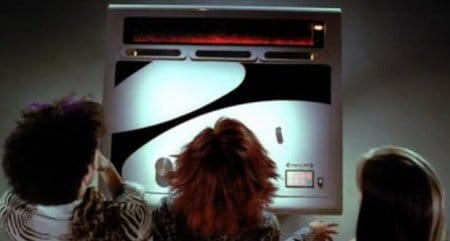
Josie and the Pussycats looking at the “Megasound 8000.” On top of “digitally enhancing” the singer’s voice (is it the ancestor of Auto-Tune?), the machine inserts subliminal messages in the music in order to convince listeners they love the band and to sell them products and ideas.
Mind Control
The movie also contains numerous references to mind control programming. As stated in previous articles, numerous celebrities have been subjected to mind control in order for them to become more easily manageable by their handlers. In bolder words, they become slaves of the industry.
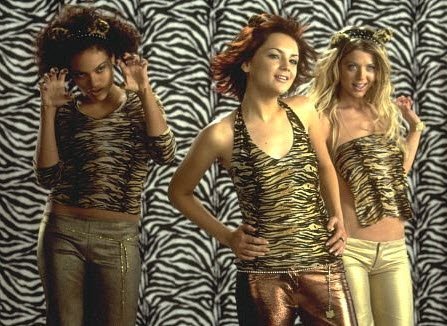
From wearing cute little kitty ears, the group is now draped in feline prints, a mind control meme signifying a subject’s beta programming, also known as Sex Kitten programming. The fact that they wore the ears before they got famous might signify the group’s predisposition to this kind of programming.
Monarch mind control includes numerous types of programming, one of them being Beta (or Sex Kitten programming). It is the type of programming that is the most used in the entertainment industry and it is coded with references to “cats,” “kitties,” “pussycats,” and also with the wearing of feline print clothing. This might explain why the producers chose to base the girl band on the Archie Comic of the same name. The symbolism was just too perfect.
So, in less than a week, with the help of subliminal messaging, the group produces a #1 hit and sells out a huge concert. The group even earns the honor of meeting the label’s CEO, Fiona.

Fiona’s “hang out” room. Notice the painting on the left. Yes, this was years before the creation of the persona named Lady Gaga.
The girls soon realize that Fiona acts in a strange, dissociative matter as if she were herself under some sort of mind control.
After the meeting, Fiona spies on the group using hidden cameras and learns that two members of the group, Melody, and Valerie, are creeped out by her and flat-out do not trust her. So she decides to go with another tactic we often see in the music business: to keep the star of the group and drop the other band members.
In order to carry out this operation, the label proceeds to use mind control on Josie by making her listen to subliminal messages in her own music. The process completely changes her attitude and personality: Josie turns from a sweet and down-to-earth girl into an attention-hungry diva who is convinced that her friends are worthless. This scene subtly describes the hidden, mind control aspect that happens in the music business: label execs use mind control programming to create an alter persona in Josie, which they can control and manage at will.
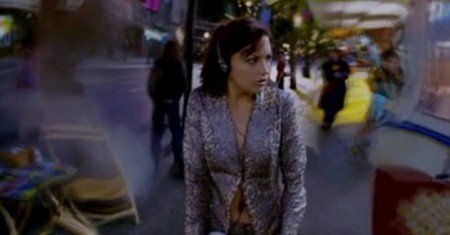
Josie, in a dissociative state due to her mind control. Everything is “blurry” and “foggy” around her. She is completely dressed in feline prints, still representing her “sex kitten” programming.
Fortunately, Josie manages to snap out of her hypnotic state and learns everything about the 3D, mass mind control concert. Unfortunately, her bandmates Melody and Valerie have been kidnapped by the label and Josie must perform in the mind control concert to avoid the “accidental killing” of her friends.

Fiona shows Josie a pre-taped segment of MTV News announcing the “accidental death” of Melody and Valerie. This is a good example of media manipulation in order to protect the elite’s interests.
I will spare you the details of the ending, but I can tell you that it involves catfights and the girls playing generic pop rock in front of a crowd that has learned to think for itself. Thank you, Josie!
In Conclusion
The least we can say is that Josie and the Pussycats is an odd movie. It strongly criticizes some aspects of the entertainment business while perpetuating more of the same. One example of this paradoxical situation is the ridiculous amount of product placements in the movie.

As a running gag, the entire movie is filled with over-the-top product placements. Directors say no money was taken for these placements…
Some of those placements are pretty hilarious (see the box of Tide above), but in the end, they too perpetuate the market ideology. Imagine me repeatedly punching someone in the face. Then when asked to stop, imagine me replying: “Can’t you see that I’m pushing this face punching to an absurd level? You’re obviously not getting the brilliant second-degree message here, I’m actually denouncing violence! So sit there and think about violence in society while I keep pounding this guy’s face.” Despite what is being said, the fact remains that pounding someone in the face is itself perpetuating violence… and this movie keeps punching the viewers in the face with product placements.
In fact, the entire movie’s message gives the same odd feeling. Its clever “behind-the-scenes” look at the music industry makes the viewers feel they’re “in on the joke,” making them comfortable enough to let their guard down. However, at the end of the day, the young viewers are still the butt of the joke: all of the sleazy and gimmicky tactics are being used on real-life viewers in order to sell them mind controlling music. Furthermore, the movie fictionalizes some of the darker aspects of the entertainment business, for example by making mind controlled artists something that one can “only see in the movies.”
At the end of the film, Mega Records’ mass hypnosis plans are uncovered, and the FBI (who funded the project) immediately attempts to dissociate from the label, even arresting Fiona “on charges of conspiracy against the youth of America.” The agent then privately says to Fiona: “We were shutting down your entire project anyways… we found out that subliminal messages work much better in movies!” This is the movie’s way of saying that even though it has let you in on the joke, the movie is still part of the plans. In other words, the biggest joke in the movie… is you.
- ChatGPT refuses to say one specific name – and it’s making people worried
- COVID 'most likely' leaked from Wuhan lab, social distancing 'not based on science,' select committee finds
- Her Family Made Her Participate In Their Scary Rituals: Mary Knight's Story
- They try to ruin EVERYTHING…
- Karma police! Arrest Ellen DeGenerate!
- It's a big club … and you ain't in it!
- Lady Gaga Performs "Paparazzi" | 2009 VMAs
Get an e-mail notification as soon as a new article is published on The Vigilant Citizen.
-

 Latest News2 months ago
Latest News2 months agoThe Controlled Demolition of Diddy
-

 Music Business3 months ago
Music Business3 months agoThe Hidden Meaning of Katy Perry’s Highly Symbolic Performance at the 2024 VMAs
-

 Pics of the Month1 month ago
Pics of the Month1 month agoSymbolic Pics of the Month 10/24
-

 Pics of the Month3 months ago
Pics of the Month3 months agoSymbolic Pics of the Month 09/24
-

 Movies and TV2 months ago
Movies and TV2 months agoAn In-Depth Look at the Hidden Meaning and Symbolism in “Blink Twice”
-

 Latest News4 weeks ago
Latest News4 weeks agoKamala’s Campaign Was Objectively the Worst in Recent History
-

 Movies and TV2 months ago
Movies and TV2 months agoAn In-Depth Look at the Dark Messages and Symbolism in “Longlegs”
-

 Latest News1 month ago
Latest News1 month agoAn “Urban Opera” in Toulouse Using Massive Machines is Denounced as a Satanic Ritual

